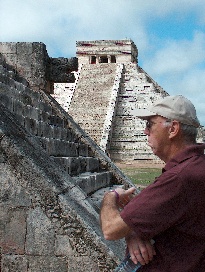 |
 |
OSEA Publications OSEA Programming OSEA Research Workshop OSEA Image Galleries OSEA Online Library OSEA News & Updates
|
 |
|
|||||||||||||||||||||||
|
Rigoberta Menchu Debates, Redux
My thought for the day that seems relevant for this debate comes from JAY F. CUSTER (University of Delaware), in his article, THE PERILS OF APOSTASY, published in NORTH AMERICAN ARCHAEOLOGIST, Vol. 26(1) 119-137, 2005. This is page 19: And also think about the following quote about Maya archaeology and anthropology
"The scandal [of Maya archaeology], I argue is not so much that what we hold
Grandin Note to GSN contexualizing his Nation article. David Stoll's Response in the GSN (Guatemalan Scholars Network) Email Newslist Reply to GSN'er Greg Grandin from GSN'er David Stoll Concerning the Recent Nation Piece And Addendum on the new edition of I, Rigoberta Menchu. Mon, October 4, 2010 11:13 am FROM DAVID STOLL Last year Verso Books sent a new edition of I, Rigoberta Menchú to press with a new preface by Greg Grandin. Verso never consulted the book's editor Elizabeth Burgos. When Grandin's new preface reached her, she objected and the new edition had to be cancelled. In the GSN Monday Mailer last week, Grandin claims that Verso Books was unaware that Elizabeth Burgos is the rights-holder. I find this hard to believe--the 1983 copyright to Editions Gallimard and Elisabeth Burgos has been on Verso's own title page since 1984. Burgos' contractual rights were public knowledge when the Casa de las Américas in Cuba awarded her its prize for testimonial literature. Burgos' contractual rights were also in my 1998 book chapter on how the Burgos-Menchú colloboration occurred and how it ended. That Grandin has just discovered Burgos' decision to retain the royalties is also hard to believe. Twelve years ago he reviewed the book in which I reported how Burgos turned over the royalties to Menchú until, after receiving the Nobel Peace Prize, Menchú accused her of stealing them. Who should we believe? Burgos' version of events has been consistent and she has shown me documentation to back it up. Menchú has made many contradictory statements. On occasion she has accused Burgos of inventing I, Rigoberta Menchú from multiple narrators (impossible); on other occasions she has claimed to be deeply involved in the editing (unlikely). The unexpected, spectacular success of her 1982 story placed her in an enduring predicament-the chasm between her initial faith in armed struggle and her subsequent disenchantment with this strategy Forbidden to acknowledge her role as a political cadre of the Guerrilla Army of the Poor, Menchú ended up blaming Burgos for her deeply subordinate status in the EGP. Grandin claims that his rejected preface moves beyond the controversy over I, Rigoberta Menchú. But his name-calling in last week's GSN mailer, as well as the excerpt that he has published in The Nation, show that this is far from the case. According to Grandin, Menchú's 1982 story requires his new preface to become "teachable" again, because the controversy (my 1998 findings) has "raised the costs" of assigning it. Since when is comparing Menchú's story with the stories of her neighbors and other Mayas a "cost?" I thought the whole point of teaching Menchú's story was to introduce students to heretofore marginalized voices, the more the better. If this is a "cost," it's because Grandin has pedagogical objectives which are complicated by listening to all the Mayas who turned against the guerrilla movement. For reasons that I have never fathomed, Grandin believes that scholars have a moral obligation to prefer Menchú's version of events and to enshrine the guerrilla movement in a way that few Guatemalans do. Whether IRM is teachable is not an issue-of course it is. How Guatemalans look back on the guerrilla movement is a more important issue-in this I agree with Grandin. What is also a significant issue, at least for people who view Rigoberta Menchú as a crucial figure, is her declining stature with her Mayan constituency. This is a phenomenon that I address in the 2008 edition of my book, which includes a new afterword by myself and a new foreword by Burgos. It's certainly not all Menchú's fault, but many of her people perceive her as monopolizing the international limelight for her own benefit rather than theirs. Staging another boxing match over I, Rigoberta Menchú, when it reverberates back to Guatemalans, will reinforce the impression that Greg Grandin and David Stoll are secret sharers conspiring to focus attention on ourselves. return to osea news pageback to top of this page From GSN email-news: ... "below is aote note explaining the circumstance of the reconsideration, which GSN’ers might find interesting. Take care, Greg I was asked by a friend recently why I had decided to address the questions surrounding the Menchú book at this time. There was a note in The Nation explaining the circumstances, but to sum up: About a year and a half ago, Verso approached me to write a preface for a new edition of I, Rigoberta Menchú, with the idea of making the book “teachable” again. The controversy raised the costs of teaching it, unless one was willing to work through all the issues that exposé raised (if you want a good illustration of Cold War terror without the baggage, might as well teach Massacre at El Mozote). So I wrote what The Nation published as a way of moving beyond the controversy, to understand both the deeper ideological thrust behind the attack on Menchú (not to mention double standard) and to appreciate the book again on its own terms, as actually surprisingly pretty good (having not read it in a long long time, I at least was surprised at how good it is). But Verso was unaware that Elizabeth Burgos, who in many ways has followed the political trajectory of France’s nouveaux philosophes (more or less the equivalent of our neocons, but more narcissistic) holds all and exclusive rights to the book, in all translations and editions. So at the last minute when she learned of Verso’s plans, she vetoed its publication. It was all set to be published — the book is still listed on Amazon as including my preface. I suspect also that even though I was generous in my essay in describing her interview method, she probably didn’t like that I said, in a matter-of-fact way, that the production of the book was more collective than she likes to present it (ie, that Arturo Taracena was more involved than she would admit). Subsequently, I have learned that Burgos has kept all of the money/royalties from all editions since the early 1990s – a fact rarely mentioned in all the commentary on Menchú. This was confirmed by both Gallimard publishers (which acknowledges that Burgos is the legal “author” of the book) and Burgos herself — in an email she admitted that she kept all the money since the 1990s, saying that “si vous souhaitez faire votre promotion de faiseur de vendettas personnelles, je serais heureuse d’expliquer à l’occasion pourquoi j’ai cessé l’envoie des droits d’auteur…..” It no doubt takes a life steeped in the excitements of the international left to summon such drama to a simple query, but there it is. Considering the early 90s forward was the period when the book really took off in sales, this must be a considerable amount of money. I’m not especially politically correct, and have always thought that defenses of Menchú’s memoir based on her position – that is, as an indigenous woman with claims to ways of knowing or speaking distinct from colonial knowledge – came up short. Yet this particular perverse arrangement does say something about the international division of labor. Menchú, having barely escaped unimaginable terror to live with unbearable sorrow, got the opprobrium, while someone else, living far away, got the cash. In any case, The Nation ran the essay as it was rejected by Burgos and Verso will be publishing a volume with an updated version – expanded to deal with the question of Burgos’ royalties – as well as with the historical section of the CEH report translated into English." return to osea news page
visitors |

